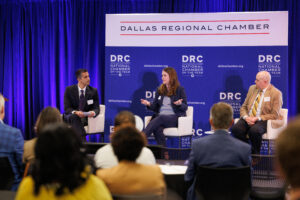The Dallas Regional Chamber convened experts on the continuum of mental health care for its Q2 Executive Circle event Wednesday, May 10, at McKesson to help Dallas Region companies better understand how to advocate for and support employees’ mental health.
“May is mental health awareness month; what more important presentation could we do for this event than mental health?” said Dale Petroskey, DRC President and CEO. “Mental health is so important to making you the best person you can be; the best employee you can be; the best colleague you can be; the best friend, parent, and so on and so forth.”

The event attracted business leaders of the Dallas Region to hear a panel conversation featuring Dr. Hicham Ibrahim, Associate Vice President and Chief Medical Officer of Ambulatory Services at UT Southwestern Medical Center, and LeAnn Smith, Executive Vice President and Chief Human Resources Officer at McKesson. The panel was moderated by Hani Talebi, Ph.D., Chief Clinical Officer and Senior Vice President for Health System Integration at Meadows Mental Health Policy Institute.
Together, the three offered both the provider and employer perspective on the mental health crisis facing America’s workforce.
“To put the issue into perspective, 32% of adults in the U.S. suffer from a mental health condition,” Ibrahim said. “When you look at the workplace, the numbers seem to be more impressive. Recent surveys show that anywhere from 60% to 75% of employees report at least one mental health symptom in the workplace.”
Ibrahim was clear that the lost productivity and poor performance often associated with employees’ mental health challenges cannot wholly be pinned on preexisting conditions but that work conditions have a lot to do with it. Conditions such as excessive workload, lack of work-life balance, boring or repetitive work, and lack of connection with supervisors or fellow employees.
“Mental health care is not one size fits all,” said Smith, adding that employee assistance plans and medical benefits are universal standards. “[The need for] connection is a common thing coming up. People feel better when they feel connected at work, and one way we can build connections is through employee resource groups.”
To help manage mental health in the workplace, Smith encouraged employers to evaluate their internal processes and whether their company culture is conducive to employees feeling comfortable speaking up about stress and other mental health-affecting factors.
“Are you overly hierarchical, resulting in a tough management style? Or do you measure your managers on their effectiveness in creating an inclusive culture and open environment?” Smith said, providing examples of questions employers can ask themselves.
Ibrahim and Smith agreed that removing the stigma of caring for one’s mental health in the workplace should be a priority and the practice should start at the top.
“Elevate mental health and mental wellness as a top organizational priority,” Ibrahim said. “It would be quite powerful for you as business leaders to share with your employees your own struggles with stress and mental health. Business leaders should be Normalizers in Chief for mental health issues and wellness in the workplace.”

Smith added it’s important to have a robust listening strategy, including surveys or focus groups to take the pulse of the workforce and training managers on how to use that data.
Ibrahim also provided an update on the new behavioral health hospital that will serve the Dallas Region, which has been a key legislative priority for the DRC for several years. Ground broke on the innovative facility, which will be operated by UT Southwestern, in December 2022.
The DRC’s Executive Circle series is presented by McKesson. HUB International Texas served as the event sponsor for the Q2 event.
If you are interested in joining future Executive Circle events, contact events@dallaschamber.org.